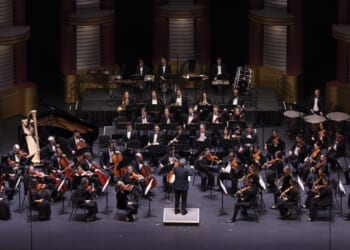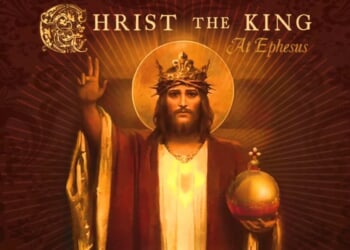When Christ pointed out the graven image of the “divine” emperor’s head on the Roman coin, saying, “Render to Caesar the things that are Caesar’s, and to God the things that are God’s,” He shocked the Pharisees by revealing a knowledge of Scripture that they wouldn’t have suspected to find in a carpenter’s son. Our Lord knew that men are made in God’s Divine Image, so while the coin can go to the State, men must go to the Church.
It seems, in this, that Christ Himself was the first to suggest the separation of Church and State, though the duties to both are clear, with primacy given to the the giving of ourselves to the institution that will save mankind and never fall as empires do. The priority of love is governed by the art of piety, which grows more complicated as the world becomes stranger and starker.
Piety is a love that people are duty bound to give, a love that is owed, due to a belonging. The three main objects of pious love are God, family, and country. In loving these, piety serves as that obligatory love from the possessed to the possessor.
Thankfully, it comes naturally to people under natural circumstances. In other words, it is only under unhealthy circumstances that piety is painful to practice or adhere to. Wordsworth expresses the sentiment: “And I could wish my days to be bound each to each by natural piety.” There is a human instinct that makes the love of home and homeland a fundamental force. But the fervor and sacrifice of piety is difficult for Catholics in these days when nations no longer follow the paradigms of Christian morality and the authority of the Catholic Church.
Piety has fallen on peculiar and even persecuted days, with the rise of secular atheism, the war on the family, unnatural laws, and crimes perpetrated by nations. On top of all this is also the deconstructionist liberal position that pushes the ideology that love of country is little more than a willingness to shamefully oppress foreign nations.
These cultural crises leave many Catholics wondering if they can with clear conscience give their coin to Caesar without placing a grain of incense on the idol’s altar at the same time. But love is most needed when it is difficult to give. Pious devotion to the Lord, loyalty to the family, and a human patriotism are remedies to the lukewarm, relativistic miasma that is destroying definitions and the natural structures where people have lived lives bound by piety.
So, how should Catholics preserve or practice piety? As adherents to tradition and the wisdom of western civilization, let’s begin with an age-old paradigm. Catholics should remember that they are part of a story that is made up of many stories that stretch back for thousands of years, and they are there to contextualize our lives to this day. The classical image of piety can be found in Greek mythology, in the Trojan hero, Aeneas, fleeing the burning city with his father on his back, leading his wife, holding his son’s hand, and clutching his household gods to his breast.
This image is perfect for Catholics as they navigate the raging ruins of culture just as pious Aeneas did. Despite the invading Argives bursting from the Trojan Horse, he never surrendered his family, those who had sired him and those he had sired. He cared for them devotedly, doggedly: leading them, carrying them, giving his life for them purposefully as he brought them through the danger. While doing this heroic act of sacrifice and strength, Aeneas pressed his gods to his heart, protecting his faith with the same determination and tenderness that he protected his family and the last surviving members of his countrymen as he found a new homeland to live in and love. In this ancient image is the key to piety and a remedy for the problem of piety and patriotism in postmodern society.
It may be a simple thing to say that we should be pious by purposefully practicing piety, as we are duty bound to do, but the simplest exhortations to love are often the most difficult things to do. Husbands lead their wives, taking on the responsibility of the character and dynamic of the family. Fathers hold their children, being warm, attentive, strong, and assuring. Sons carry their parents, bearing the burden of their old age, honoring the love and sacrifice that was and that paved the way for the present. Citizens uphold civil law and engage in civic participation for the common good and are respectful and active in supporting and defending the country that allows them to live the good life. And above all, keep God the closest: pray, defend, and bear the Faith wherever you go, making it a first and guiding priority, making Aeneas’s gesture become the strategy, “seek ye first the kingdom of God and all these things will be added unto you.”
Though Christendom is no more, with not one nation left that acknowledges the vital role of the Catholic Church in society, the same corruption that religious freedom crusaders like St. Anselm and political martyrs like St. Thomas More fought against to preserve Christian culture remains. And Catholics today must keep up the fight by keeping the Faith—for though Christendom is dead and beyond resuscitation, the foundations of western civilization, of western culture, are Catholic and not beyond reviving and restoration. The image of Aeneas demonstrates the truth of that.
Though love of God and family and home is natural enough and clear enough, the effort to connect with a Catholic attitude in political society is becoming increasingly difficult with governments making a whole host of wrongs not just right but legal rights and waging complicated wars all over the world. But when it comes to finding a Catholic position regarding the rancor of warring religions and regions, there are certain clear lines that must never be crossed: lines like terrorism, genocide, political ambition, amoral allowance, and false beliefs regarding the Lord.
Again, simplistic though it may sound, complex times are often best met with simple strategies. Catholics should therefore remain on the side of love, life, and peace—though not at the sake of the righteous defense of one’s nation and the true Faith—and realize that wars being fought are not holy wars from a Catholic point of view.
The struggle to be pious and patriotic is striking in this age when the separation of Church and State has resulted in a subjugation of the Church by the State—all in the name of money and power, appropriating the piety we owe to God for our political figures and systems. With wars over sovereignty and the familial and cultural breakdown in America, the complicated and contested Catholic political outlook is compellingly presented in a new book by Dr. Taylor Marshall: Christian Patriot.
In this accessible and powerful work released this month, Dr. Marshall tackles the history, the theology, and the tough moral questions regarding how Catholics should love their country in a Catholic way, keeping themselves for God as they give the coin to Caesar. And in this argument for the Catholic attitude in God-centered patriotism, there is a rediscovery of the virtue of piety, that deliberative love all must distribute justly. As a thorough investigation of civic Catholic concerns, Christian Patriot and a solid vade mecum for Catholics intentionally navigating the political quandaries of the day while balancing their Faith in the noise of what Marshall calls wars on the soul.
As Christ taught with Caesar’s coin, all men are made in the image and likeness of God and were made to secure salvation in the one, holy, Catholic, and Apostolic Church. The ultimate political mindset of Catholics should be to encourage and establish conversion to Christianity. With the ways and the wrongs of the world today, the only true path to peace on anything approaching a global scale lies in conversion. Conversion is the only answer, and wild though it may seem as a goal, it should be the solid and stated Catholic position through prayer and promotion.
In his letter to the Ephesians, St. Paul calls for the union of all, the spiritual unity of all the people of God in the Mystical Body of Christ, and so should pious Catholics direct their prayers. Such unity would result in correctness in the lives of all: in true faith, true charity, true adherence to the will of God—and true piety.
Catholics should love their country, but the Kingdom of Heaven is the highest home. As Dr. Marshall puts it, we must live in the city of man but serve in the city of God. Such unity may seem like an impossible position to hope for or propose, but Catholics believe that with God nothing is impossible. Pray, then, for the conversion of all; take up the example of pious Aeneas; give your coin to Caesar but yourself to God. Towards all these ends, pick up Dr. Marshall’s book as a starting point, hoping for the miracle of all being united in the peace of Christ.
Photo by Steven Weeks on Unsplash
















